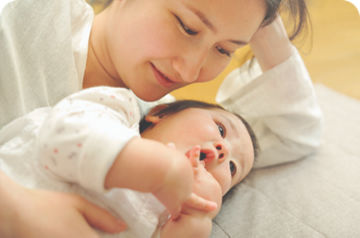Breastfeeding is the best for babies and a healthy diet / maternal nutrition is important when breastfeeding. A decision not to breastfeed can be difficult to reverse. Infant formula is suitable from birth when babies are not breastfed. It is recommended that all formula milks be used on the advice of a doctor, midwife, health visitor, public health nurse, dietitian, pharmacist, or other professional responsible for maternal and child care and the financial implications should be considered. All preparation and feeding instructions should be followed carefully as inappropriate preparation could lead to health hazards.
What Are The Signs Of Postpartum Depression?
Generally, postnatal depression happens in the first six weeks after birth, but it can also appear at any time until your baby reaches toddler age. You're more likely to experience it if you or your family have a history of depression.
Postnatal depression affects people differently but there are some symptoms you can keep an eye out for, such as:
- Having panic or anxiety attacks.
- Constantly worrying about your health and safety and those close to you.
- Feeling you're a bad mother or person.
- Constantly experiencing feelings of doom.
- Regularly feeling tearful for no real reason.
- Wanting to sleep all the time and never feeling rested.
- Finding it hard to sleep.
- Feeling like you have to put on a 'brave face' around other people.
- Being unable to talk about the birth or constantly talking about it because you felt so out of control.
- Feeling that life is not worth living since your baby was born.
- Feeling worthless.
- Thinking you haven't bonded with your baby or have no feelings towards them.
- Feeling ill; suffering chest pains, breathing problems, headaches, dizziness, many minor illnesses and stomach upsets.
- Losing track of time and not being able to tell the difference between a few minutes and a few hours.
What to do if you think you have postnatal depression
If you do feel you may have postnatal depression, talk to your doctor - they'll be best placed to help you. There are things you can do to help lessen the symptoms:
- Don't bottle up your feelings. Talk to your partner, a close friend, relative or other mums about what you are going through.
- Don't try to do too much in a day.
- Accept help from those around you.
- Take time to rest.
- Don't feel guilty about what you're going through.
Disclaimer: All content on this Website is provided solely for informational purposes and is not intended as a substitute for medical and/or other professional advice for your specific condition. Please do not disregard medical and/or other professional advice or delay seeking it because of something you have read on this Website. Always seek medical advice before starting any new treatments.


Ask Our Careline
Whatever’s on your mind, we’re here to help



